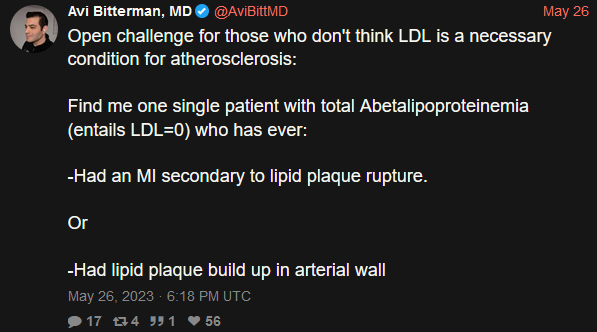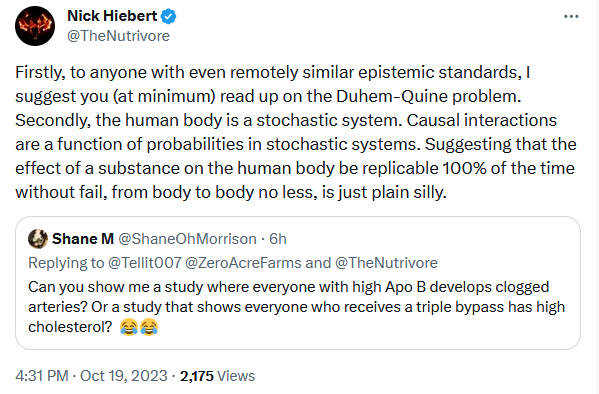A_User
#2222
What do you mean with it being a hallucination?
PCSK9 inhibitors is usually used to lower at least LDL from around 60 to 20-30.
LaraPo
#2223
Depression and anxiety can spring from many causes, including possibly low cholesterol. Symptoms of depression and anxiety include:
- hopelessness
- nervousness
- confusion
- agitation
- difficulty making a decision
- changes in your mood, sleep, or eating patterns
1 Like
A_User
#2224
It’s a correlation and not causation. The PCSK9 inhibitors have no side effect on mood and since it’s clinical trials, it can assess causality. Statins tend to improve mood.
Generally the strongest signal in genetic studies is triglycerides and negative mood, meaning higher is worse.
2 Likes
scta123
#2225
Because it tells a more complex picture of ASCVD.
You are making it sound simple, very low LDL-C no ASCVD, high LDL-C ASCVD.
I believe you can only take LDL-C into account together with other risk factors. On its own has a poor predictability of ASCVD. And while it might be true that low LDL-C means much lower probability of ASCVD the vice versa is not true. High LDL-C does not automatically mean ASCVD and in older population somewhat higher seems it is even protective (at least this vaguely seems so from large cohort observational studies).
2 Likes
Erk41
#2226
The reduction in overall mortality amongst the very old who take statins may not be related to lipids at all, but rather to a statins ability to induce autophagy.
1 Like
A_User
#2227
Here’s an open challenge for you.

2 Likes
José
#2228
Here is a real challenge, in the future one of us will live longer.
That is real fact and reality.
3 Likes
A_User
#2229
I never said high LDL-C means automatically ASCVD.
I only said ultra low LDL-C means no ASCVD.
It is the necessary cause.
Correlational evidence has less predictability compared with causal evidence as it has a lot of confounding factors. Causal evidence excludes confounding factors and find independent risk factors. LDL is an independent risk factor which means it is very detrimental with or without other risk factors. This risk factor independence of LDL was discovered by clinical trials and genetic studies.
1 Like
A_User
#2230
“Why doesn’t everyone with high apoB get ASCVD (clogged arteries)?”

Anyone know about stochastic systems and how causal interactions work in them (couldn’t find a link right away)?
1 Like
A_User
#2232
Wow what a great video everyone should see it. It has everything in it. I agree with his approach and the only reason I would consider statins over other drugs is because of monetary cost just like he does.
Peter Attia uses a PCSK9 inhibitor and Ezetimibe+Bempedoic Acid combo to bring his apoB down from 90-100 which is around the 50th percentile to the levels required to make ASCVD irrelevant.
3 Likes
With a rosuvastatin and ezetimibe combination you can already reduce your LDL levels by 60-70% depending on the dose for 10 bucks a month. For the average adult that means going from 130mg/dL to anywhere from 30-60mg/dL which is pretty close to the recommended 20-40mg/dL level.
2 Likes
A_User
#2234
Maybe, 5 mg rosuvastatin my apoB levels weren’t as low as I wanted to be, and I have to be more careful than others about suppressing cholesterol synthesis in my brain because of my APOE4 allele increasing Alzheimer’s risk. Long-term I am probably not going to use statins, but I might use it until other medications become cheaper depending on when Bempedoic Acid will become available in the EU.
2 Likes
Neo
#2235
Do we know what he is getting it down to?
1 Like
Neo
#2236
May I ask where this recommendation is from?
A_User
#2237
Peter said his target is 30-40 mg/dl and he takes three drugs to achieve it. So that is the level he is getting it down to.
2 Likes
LaraPo
#2238
Got tests results today:
|Lipoprotein(a)
Your Value9 nmol/L
Standard Range<75 nmol/L
Apolipoprotein A1
Your Value
219 mg/dL
Standard Range >140 mg/dL
|Apolipoprotein B,
Your Value109 mg/dL
|-- REFERENCE VALUE –
Desirable: <90
Above Desirable: 90-99
Borderline high: 100-119
High: 120-139
Very high: > or = 140
I didn’t fast. Was it a mistake?
Mogli
#2239
20231027164648.pdf (128.4 KB)
Please Poke holes as you wish on these results and as much as you can. To me it’s mostly gibberish. LOL
Thanks,
btw- not worried about the glucose part since i think i had stuffed my mouth with couple muffins that day (used to have free breakfast at work) as this test was done before i ever started on watching what i eat.
"Other lipid fractions, including total cholesterol, high-density–lipoprotein (HDL) cholesterol and apolipoprotein B100, do not change substantially after eating. Other high-quality studies have shown that nonfasting lipid levels predict risk for coronary heart disease and stroke better than fasting lipid levels.
Nonfasting lipid testing: the new standard for cardiovascular risk assessment - PMC.
2 Likes